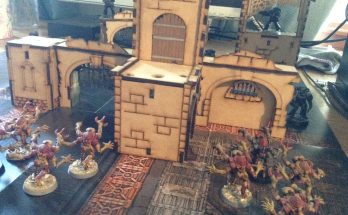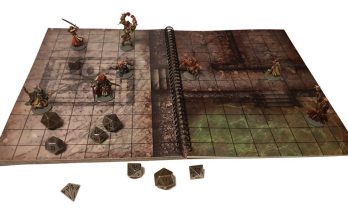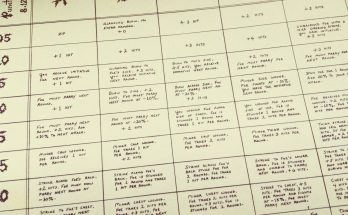Picture the scene. Wall-to-wall dials, switches, knobs and twiddly things. There’s no one else in the room. Just you. I give it 15 seconds tops before every single one of us will reach out a hand to one dial at random and give it a tweak. Then another, and another – small changes at first then an unremitting frenzy of dial-spinning joyous lunacy.
We’re gamers. We’re built like that, and that’s just how it is. Dials are meant for…. well, dialling. Anything else is form ignoring function, and that will never do.
And yet, when we open our role-playing books we treat them like sacred things. These tomes are chock jam full of virtual switches, dials and twiddly things that we can switch, dial and generally twiddle with – and yet all too often, that’s exactly what we don’t do. “But it’s not RAW!” we cry, proclaiming heresy on anyone who doesn’t use the Rules As Written.
Here’s the thing. The Rules As Written are a starting point. They are the dials mutely sitting there waiting to be messed with, nothing more.
Time for a quick example.
One of my gamer buddies loves Classic D&D (as do I), but I’m trying to talk him into giving 4e D&D a chance. He’s read far too much net-spawned anti-hype and I’ve managed to debunk most of it for him, but the one sticking point is that he loves the way that Races are Classes in Classic D&D. There’s no Race/Class combos – if you’re a Dwarf you’re a Dwarf, and an Elf is just and Elf. The Fighter, Cleric, Thief and Magic-User classes are just for humans with ideas above their station.
So, I run a quick solo one-shot for him, and tell him to ignore the whole Races chapter in the PHB. Rangers are renamed Elves, and Warlords are now Dwarves. Clerics, Fighters and Wizards are all Human by default, and Rogues can either be nominally Human or Halfling, but there’s no in-play distinction between the two. His character doesn’t get the attribute bonuses or special racial features, but he’s a happy bunny. Elves are Elves and Dwarves are Dwarves again (even though they’re really Rangers and Warlords under the hood).
All I did was turn a fairly large crank-handle, and the game stopped being the Rules As Written (by somebody else), and became My Rules. Turning that handle drew another gamer into our fold. Later, I’ll turn the handle back and show him the cool things that Races get, but for now he’s happy enough with his Ranger Elf, so it’s all good. His character is a little less powerful than a regular character would be, but that perfectly suits his old school mind.
Likewise, if you don’t like to play using Skills, flick that switch and turn ‘em off. If you don’t like Powers, ignore them or switch in something different. D&D Essentials goes part of the way by emphasising Basic Attacks over Power-related combat effects. It’s your game first and foremost, so if you don’t like something about it, don’t just moan about it – change it. Then blog about what you changed. I’d love to know.
I’d much rather play My Rules than by the Rules As Written, any day of the week – even if My Rules can, and will, change according to the needs of the campaign, players or by random experimentation. That’s the nature of dials. They aren’t made to be left in the same place for long.
You stand before a large panel of switches and dials. Get twiddling.




Good post. I was thinking of switching off feats lately.
I agree heartily. My own on-going campaign started off as Microlite20 (thank you, by the way :p), which is effectively 3.5 with nearly all the switches switched off. I’ve since ported fears back in (although they’re optional for each player), completely overhauled the spells for wizards (each spell can be varied in effect and HP cost), and completely replaced the mechanics for clerics (they have to make a communication check to ask their god for aid).
I LOVE fiddling with dials.
Hmm . . . . I’m in Vault 13, so I turn the crank and the Vault door opens up. Hey, I’m out! (I’m liking Fallout)
Actually, I kinda did this to lampoon some of the race powers in D&D. My cousin pointed out that I stole the blood elves wholesale — I did it for satire. I wanted to show how stupid the Feystep power is for Eladrin in the first place. :)
One of these days, I’m going to get around to satirize the paladin. The paladin is my least liked class in 4e. For me, the Warlord is as much the new paladin and the paladin is too much of a Wesley.
Oh, just in case your wondering what a Wesley is, the Wesley is in reference to Wesley Crusher from TNG.
http://tvtropes.org/pmwiki/pmwiki.php/Main/TheWesley
Wil Wheaton hated Wesley!
Not using feats, skills, and powers sort of defeats the purpose of using a fairly complex RPG such as 4e or 3e, certainly financially. Why buy into a highly detailed system, when you can download a free one that’s close to your liking and then revise it? Especially if you’re going to revise it anyway, as any good DM would.
Because D&D4E w/o feats works great for me and those free systems don’t, for example.
And there was a great article by Rob Donohue about ease vs. simplicity. Risus is simplier, but D&D4E is easier to run.
Here’s a few reasons, off the top of my head:
– 3e & 4e D&D are better supported
– Your players will only play D&D and not that indie game you’re itching to run (Trust me. I’ve been there.)
– You already have the books
– To tweak things to better suit your campaign setting
– You don’t like changes made by one of WoTC’s updates. Change it back or (better yet) improve upon it
– Highly detailed systems have more switches to fiddle with
– Because you can :D
On a larger level, is the real purpose of an RPG to play the game, or to play with the rules? Are the two inextribly linked, or is one the excuse to actually to do the other?
Free free to expound in a separate blog entry if needed.